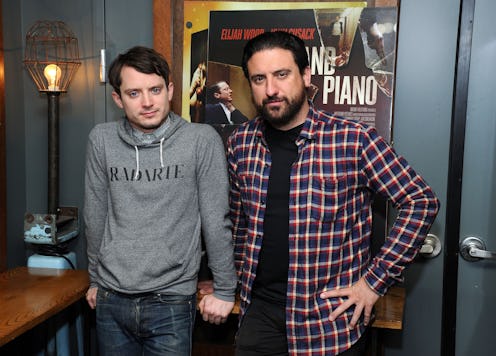Entertainment
Elijah Talks Hitchcock-esque Thriller
"Play one wrong note and you die." These are the words Elijah Wood's character finds scrawled across his sheet music the moment he is about to start playing in front of Chicago's most critical audience. His hands steady on the piano's black and white keys, and he sees a small red dot materialize on the paper, then snake up his arm, his chest, and land dead center in between his eyes — one wrong move, and he dies. Bustle spoke with the film's star, Elijah Wood, and the film's director, Eugenio Mira, about creating the suspenseful thriller that is Grand Piano .
"It’s a thriller, it’s a classic thriller," Wood said of the film. "It's also a mystery." But his director was quick to comment: "Mysteries are always up for interpretation. It can be True Detective, it can be Silence of the Lambs."
But Grand Piano is another story all together. The film follows Tom Selznick, the most noted pianist of his generation, who stopped performing in public because of his severe stage fright. With a nudge from his actress wife, he agrees to perform a concert in front of Chicago's most prestigious audience in a sold out show. But as he takes the stage he sees the ominous note, and must determine who has taken him hostage and what their motives might be. The villain's voice materializes in an earpiece he is told not to remove, and gives him specific instruction, that if he fails to complete, will result in the death of both himself and his wife.
But while most modern thrillers rely on cheap tricks, like multiple, aggressive camera angles, explosions, and chase scenes, Grand Piano harkens back to a time when a single thread of suspense was enough to sustain the attention span of an audience for an entire film. Nearly the entire film takes place with Wood seated on the piano bench, with John Cusak's recognizable voice narrating through his earpiece. It is simple — elegant even — and requires a kind of patience from the audience that is rarely asked from films made in 2014. We've seen this kind of filmmaking before, but not for several decades. Grand Piano is reminiscent of Alfred Hitchcock's most beloved thrillers. The Man Who Knew Too Much, starring James Stewart and Doris Day, is hugely similar in its climax, while being more than 50 years old.
"I was raised by directors as a spectator. I am a kid of the 80s. I saw The Goonies, Back to the Futureand Spielberg movies," Mira explained. "What they put in those movies beyond the stories, was the message that you can do amazing stories in your backyard. The extraordinary is possible. Nowadays it’s a romantic kind of expression. Believing through the size of the shot and the length and when the camera is going to come, you’re telling something in a way that you cannot do in other mediums. The only place I feel comfortable is the intimacy of the design of a movie. Mainly, the core of this project is to do something more than a homage to Hitchcock and Roman Polanski."
And while the film focuses on simplicity, for its lead, shooting sequences seated at the piano was anything but easy. This is because not only was Elijah Wood acting with Cusak rambling in his ear, but he was actually playing the piano. That's right, every single note and song was delivered by Wood's fingers as the cameras rolled. The infamous piece the film focuses on, "La Cinquette", is described as technically impossible for any musician, yet Wood nails it. The actor told Bustle that this was the most challenging part of filming. While Wood had taken piano lessons as a child, he only had about three weeks to brush-up on his skill before they began filming in Barcelona. "The biggest challenge for me was trying to encapsulate playing the piano, listening to John Cusack, speaking, responding and being on time with my beats. A lot of it was just logistics and technical things," Wood explained.
In the case of Grand Piano, the score, which was performed by an actual orchestra and Woods' fingers on the keys, is as much of an intregal character as Cusak or Woods himself. "It was intense," Wood admitted, "but it was so much fun. We shot almost in sequence, at least from when my character steps out to play the piano. The beauty of that was that we had three or four days of relatively light material before things got really complicated musically. So those first four days I bought my own confidence. I was able to go, ‘Fuck, I can do this.'"
But learning to play intricate melodies on the piano wasn't the only part of shooting that was untraditional. "It’s a slightly different process. Traditionally with a film, you shoot a scene that can take 2 or 3 days. In this case, it was literally shots. So our call sheet was comprised with shots, not scenes. It was highly technical, but I had all of the information at my disposal. I found it really enjoyable," Wood said. "I knew the movie he wanted to make because it was beautifully articulate within the context of a moving image. Then we were working together on a daily basis to recreate the individual pieces of the puzzle. It was literally an open puzzle and we were putting back the pieces back in, backward."
Grand Piano is in theatres Friday, March 7. Watch the trailer below:
